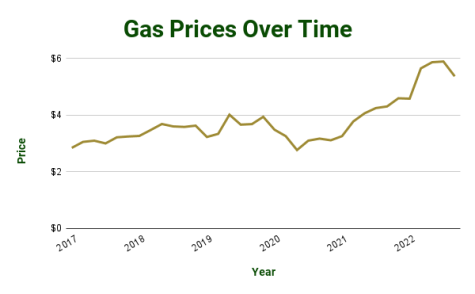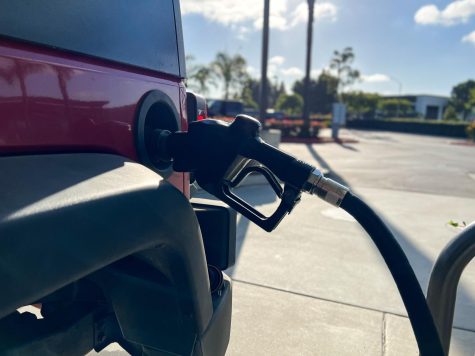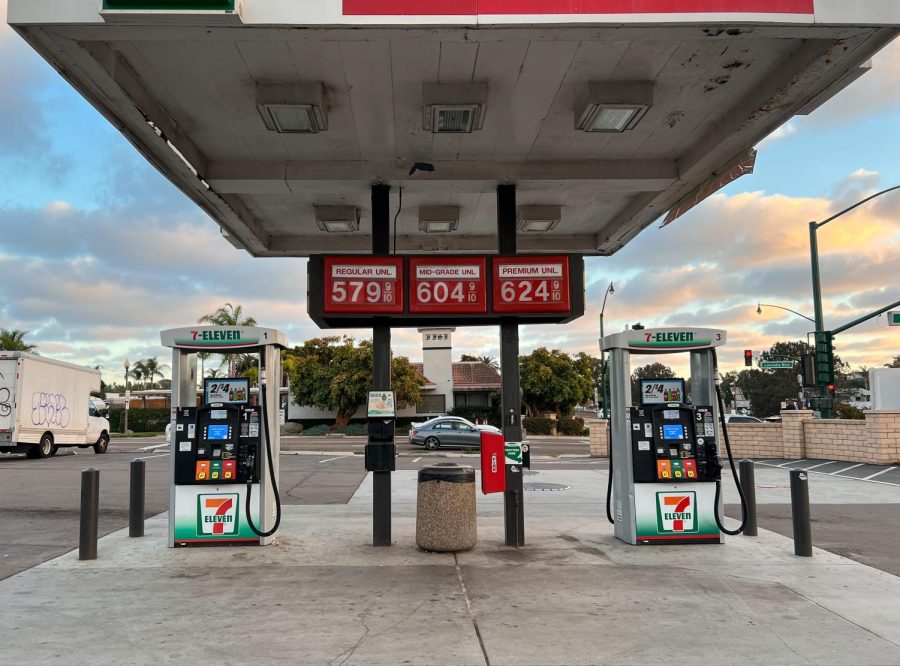Gas Prices Drop 30 Cents from Last Week
Normal gasoline at a local 7/11 station in Encinitas sits just below $6. Although fuel generally costs more in California, prices in San Diego county are consistently even higher.
For most Californians, owning a car is just a fact of life – and so is filling it with gas. Recently, however, getting gas has felt like even more of a chore due to California’s comparatively astronomical gas prices.
After nearly a year of record-breaking gas prices, California might finally be on its way back to the lower costs that everyone misses. On Oct 26, gas hit $5.675 per gallon, 30 cents cheaper than it was a week prior. This sudden decline follows a significant drop in fuel costs in August and a slight increase in September.

A 30-cent difference may not seem like much, but it could signal the start of a steady decrease towards reasonable prices. For millions of optimistic commuting Americans, this drop is reason to celebrate.
Many students who drive themselves to school, like senior Finn Deatherage, are experiencing this hope, too.
“I hope that gas prices keep going down because I end up spending a ton of money filling up my car weekly,” Deatherage said. “I have to drive 12 miles almost every day just to and from school, and it adds up really quickly. I know a lot of people that have to commute even farther, and I can’t imagine how much they end up spending on gas.”
To most people, news like this only matters if it represents the start of a trend rather than a small dip on a gas price graph. Sudden decreases have given Californians false hope many times before, leaving them wondering about the reasons behind the state’s uniquely high yet inconsistent gas prices.
Locals have reached out to CA-49’s congressional representative, Mike Levin, urging him for answers and action. The congressman claims that there is no easy solution to the complicated issue, but he is working to explore the reasons behind the fuel crisis.
“Despite the increasing disparity between California prices and the rest of the nation, the industry has provided no clear explanation on why prices are rising so rapidly,” Representative Levin said in a press release.

The lack of answers has led to suspicions and accusations of foul play toward industry leaders.
“I am demanding the Federal Trade Commission start a federal investigation into Non-competitive practices, anti-consumer behavior, and market manipulation by California oil refineries,” Levin added. “Our constituents deserve answers and you deserve to hear from the oil refineries.”
Despite this promising step, many critical Americans expect more from their representatives than investigation and claim that the fuel crisis is a political problem with political solutions. Travis Gilley, a Carlsbad father and long-time gas station owner, shares his insight on how public policy affects his business.
“I can’t tell you how much the policy makes a difference,” Gilley said, citing the struggles he has faced while operating a gas station and offering potential legislative solutions. “For example, places like California have much stricter air pollution guidelines which means we have more expenses and gas taxes – we have 68 cents more taxes than other states. Also, if America is producing a lot more oil and gas through processes like fracking, for better or for worse, that’s going to help keep the prices low.”
Environmentally-focused regulations may contribute significantly to the fact that California’s gas prices are often more than 60% greater than the national average, but long-term legislation doesn’t explain why fuel has been unusually costly for the past several months.
“The main reason that gas is so expensive in San Diego right now is that [oil companies] were supposed to do a ton of equipment upgrades in all the California refineries in the Spring, but refiners were making a lot of money in the Spring and decided to push these repairs off until the fall,” Gilley said. “Now, half of our refineries are closed, and because [California’s gas stations] sell boutique blends of gasoline, which are better for the environment, we can’t borrow gasoline from other states.”
The combination of controversial policies, suspicious business practices, delayed maintenance and even geopolitical issues has driven fuel prices to unprecedented rates. However, as the government begins to crack down on the gasoline industry and refineries complete their repairs, Californians can expect further fuel cost reductions just like last week’s 30 cents.



Joel Valdez ◊ Oct 27, 2022 at 12:23 pm
If American cities weren’t so dependent on cars as a mode of transportation, then high gas prices wouldn’t be a major of a problem as it is. But instead we intentionally built places farther away so they can only be accessed by car, crushing neighborhoods and buildings with massive parking lots and highways. No wonder most of us are inside all the time; every social place is too far to get to without a car. That sucks. This place sucks.
William Lee ◊ Nov 29, 2022 at 12:21 pm
Fr tho, I’d like the start of public construction like subways and stuff.